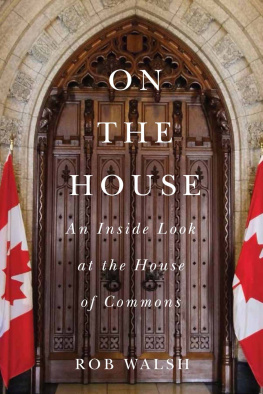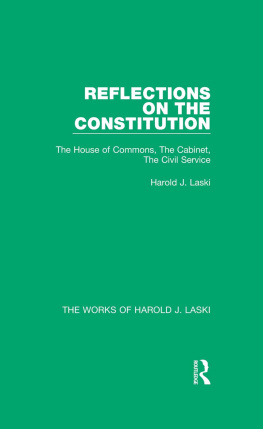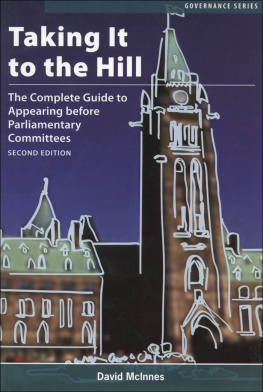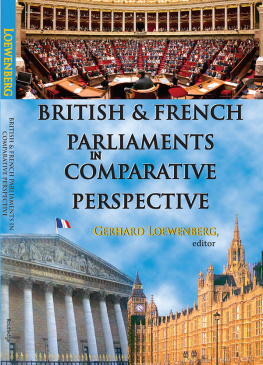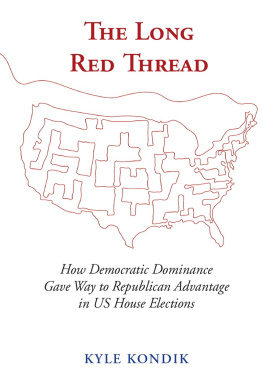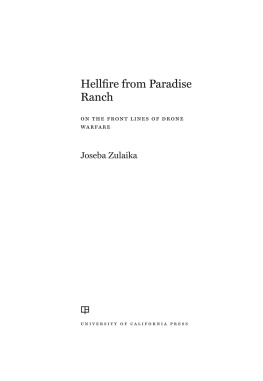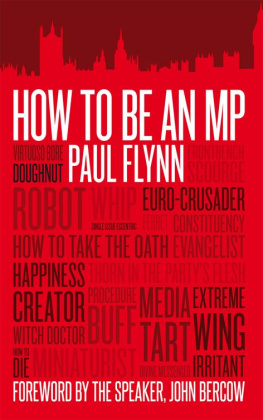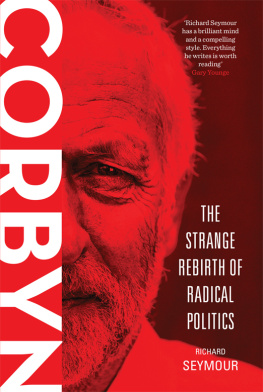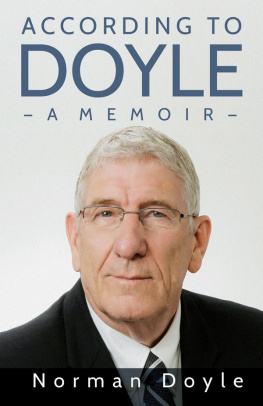
ON THE HOUSE
On the House
An Inside Look at the House of Commons
ROB WALSH
McGill-Queens University Press
Montreal & Kingston London Chicago
McGill-Queens University Press 2017
ISBN 978-0-7735-5145-9 (cloth)
ISBN 978-0-7735-5223-4 (ePDF)
ISBN 978-0-7735-5224-1 (ePUB)
Legal deposit fourth quarter 2017
Bibliothque nationale du Qubec
Printed in Canada on acid-free paper that is 100% ancient forest free (100% post-consumer recycled), processed chlorine free.
McGill-Queens University Press acknowledges the support of the Canada Council for the Arts for our publishing program. We also acknowledge the financial support of the Government of Canada through the Canada Book Fund for our publishing activities.
Library and Archives Canada Cataloguing in Publication
Walsh, Rob, 1946, author
On the House : an inside look at the House of Commons / Rob Walsh.
Includes bibliographical references and index.
Issued in print and electronic formats.
ISBN 978-0-7735-5145-9 (hardcover). ISBN 978-0-7735-5223-4 (ePDF). ISBN 978-0-7735-5224-1 (ePUB)
1. Canada. Parliament. House of Commons. 2. Democracy Canada. 3. Canada Politics and government. I. Title.
JL161.W35 2017 | 328.71072 | C2017-903966-0
C2017-903967-9 |
This book was typeset by True to Type in 10.5/14 Sabon
For the
Institute of Parliamentary
and Political Law
Institut de Droit Parlementaire et Politique
Contents
by Peter Milliken
Foreword
PETER MILLIKEN
A book about the workings of the House of Commons that is neither a procedural manual nor an academic critique of its functions is a rarity. Rob Walsh, the Houses law clerk and parliamentary counsel from 1999 to 2012, has written a book about his experience as legislative counsel that provides us with an informative and useful review of both the role he played in helping the House function and the way the House deals with many of the things for which it is constitutionally responsible. Mr Walsh served the House for over twenty years and provided advice to members, committees, and staff on a huge variety of issues and questions. He has written a book that will be very helpful to members, advisors, students of Parliament, and professors in the political sphere as well as compiling a wonderful package of information for those interested in the functioning of our Parliament.
The law clerk provides advice on the legislative process to members, standing committees, procedural clerks, committee staff, the Speaker, and the Board of Internal Economy that governs the financial and administrative business of the House, as well as to others who request advice to ensure that bills introduced into the House will be lawful if adopted, are passed in accordance with the law and the rules of the House, and are within the legislative competence of the Parliament of Canada. His book sets out many details of how our system functions, how decisions are made in Parliament, and how the legislative role of the House operates in rendering decisions on many matters that are brought forward in government bills and private members bills debated in the House and considered in committees.
Mr Walsh served during five majority parliaments and three minority parliaments so his book reflects events that varied greatly in different circumstances. The role of the House and its committees change with shifts in government and this makes the book a wonderful read for those interested in how our parliamentary system works. I had the pleasure of working with Mr Walsh for most of the time he worked at the House of Commons and much enjoyed his counsel and ideas, as did many of my colleagues. This book represents a very substantial contribution to information on how our legislative process operates and will be of considerable interest to those who are involved in it or who wish to learn more about it.
Hon. Peter Milliken, BA, MA, LLB, PC, OC, FRSC
MP, Kingston and the Islands (Ontario) (19882011)
34th Speaker of the House of Commons (200111)
Prologue
Imagine youve been elected to the House of Commons. Youd been politically active in your hometown but hadnt thought of running for Parliament until friends urged you to go for it. It was a long shot; you never thought youd win but you did. Youve packed your bags and found your way to Ottawa (which you had never visited before). And here you are.
Youve had many tasks since election day. Youve had to find a place to live in Ottawa during each session (something members from ridings around Ottawa dont need to worry about), move into the parliamentary office assigned to you, start recruiting staff, and establish a constituency office (unless you can take over the outgoing members office).
House Administration organized a day-long orientation session that helped a bit, providing mostly administrative, financial, and legal details relating to the institutional organization of the House, staffing your offices, and managing your office budget as well as enlisting some veteran members to sit on panels to talk about the ups and downs of the parliamentary life youre about to begin. You may have found this somewhat overwhelming: too much information too soon. A House Administration staffer has been assigned to assist you in getting organized before the opening of Parliament in a few weeks. You attended your first party caucus little more than a hello-how-are-you gathering where you met fellow party members from parts of Canada youd never visited. Youre soon looking forward to getting back home and you hope to get back before returning to Ottawa for the opening of the new Parliament.
When the first Bloc Qubcois members arrived, they were uncomfortable swearing allegiance to the Queen as they were committed to seeking Quebec independence and some observers agreed that it was hypocritical of them to take the oath. For my part, I didnt see any contradiction between the Blocs pursuit of Quebec independence and loyalty to the Queen as they had always made it clear that they sought Quebec sovereignty through democratic means.
As a newcomer, youll probably be seated in one of the back rows of the Chamber, perhaps in the second-to-last row, which has dropdown seats, not armchairs like the other rows, and was added in 2015 to accommodate the thirty additional seats needed to maintain proportional representation in the House following population changes reflected in the last decennial census (2011).
As a member of Parliament, you are at the beginning of a new chapter in your life, probably unlike anything you have ever done before. You will learn and learn and never stop learning, developing parliamentary skills largely through trial and error. In addition to proceedings in the Chamber or in committees, there will be lots of meetings, private political consultations with constituents or constituency groups or with other members or your staff, and lots of travelling and many nights without enough sleep and frequently finding yourself eating on the run or not at all (be careful). In the meantime, your constituents back home will follow reports on the House in the media, particularly when you are featured, and will look forward to hearing your explanations of what goes on there.
Id like to share with you how I experienced the House; as you become immersed in it, my observations may give you a sense of the place from the perspective of someone working downstairs, supporting your parliamentary and political world upstairs. It was quite a learning experience for me and likely will be for you, too.
Next page
